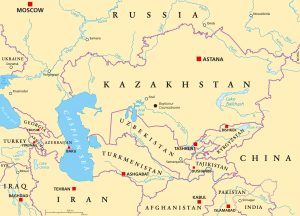Media in Kyrgyzstan and Tajikistan recently reported on the deaths of ethnic Central Asians in Ukraine. Bodies of those killed in Ukraine were reportedly returned to their native villages for burial in March, bringing the war — whether local media call it that or not — closer to the region.
Since the collapse of the Soviet Union in 1991, hundreds of thousands of Central Asians have obtained Russian citizenship, though exact figures are elusive. For example, in 2018 Kyrgyz authorities claimed that since independence more than half a million Kyrgyz had obtained Russian citizenship. At the time, officials noted that the pace of Kyrgyz seeking Russian citizenship had slowed because of the country’s accession to the Eurasian Economic Union, which simplified the process of migrating to Russia for work. Meanwhile, it appears that the numbers of Tajiks seeking Russian citizenship in recent years has grown. In 2021 alone, Russian authorities said more than 100,000 Tajiks had obtained Russian citizenship, in contrast to around 30,000 back in 2016. Kyrgyzstan does not recognize dual citizenship, but Tajikistan does.
RFE/RL’s Tajik Service reported that the bodies of four Tajik men were brought back to the country after being killed in fighting in Ukraine. The service, locally known as Radio Ozodi, was able to identify two of the men, a 50-year-old and a 38-year-old who were both returned to Hamadoni district in southeastern Tajikistan by officers from Russia’s 201st base, which is in Tajikistan. The district borders Afghanistan and until the early 2000s the border was patrolled by Russian forces.
In Kyrgyzstan, 24.kg, which in its reporting hews to Russian phrasing — calling the conflict in Ukraine a “special military operation” — said that the body of a 20-year-old man would soon be returned to Issyk-Kul, his place of birth. The young man’s mother, who works in Russia, was reportedly informed of her son’s death as early as March 8, with Russian authorities confirming the death in a March 22 statement which referred to him as a “Russian citizen, a native of Kyrgyzstan.”
The exact number of ethnic Central Asians serving in the Russia military is not known, nor is the precise number of those killed in the Ukraine conflict so far. Russian authorities said in early March that just under 500 Russian personnel have been killed; NATO officials suggested the total was somewhere between 7,000 and 14,000. It seems at least some Central Asians are among the dead, and there may be more to come, given reports of Central Asian migrants joining the war effort in exchange for pay and promises of Russian citizenship.
RFE/RL’s Uzbek Service tracked down an Uzbek driver who made a viral video of himself driving a Russian Army truck into eastern Ukraine. The “driver from Fergana” said he’d accepted a three-month contract as a driver in exchange for Russian citizenship, housing, and a salary of 50,000 rubles a month (worth $590 when RFE/RL first reported it on March 1, $475 on March 17 when Colleen Wood and Sher Khashimov reported on the case for the Moscow Times, and closer to $490 now — an illustration of the ruble’s wild ride). He allegedly found the job listing on a migrant job website, UzMigrant, and said there were other Central Asians who had taken similar deals.
Meanwhile, as Wood and Khashimov reported, migrants still in Russia may be feeling the pressure to join the conflict via recruitment efforts, varying from tents in the Moscow metro advertising positions with the “Volunteer Army of the Donetsk People’s Republic” to suspicious phone calls offering expedited citizenship for a service contract. It’s not clear if these are actual Russian government efforts, opportunist scammers, or something in between.
The economic fallout of the war will weigh down Central Asian economies: via currencies which rise and fall with the ruble, spiking food prices (a product of trade linkages to Russia), and a lack of jobs and income for Central Asian migrant workers in Russia. This may make the salaries reportedly being offered for contract work with the Russian military (or adjacent to it) even more attractive.

































